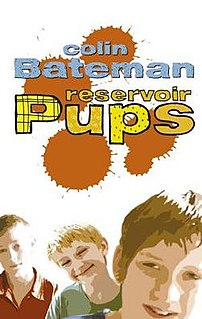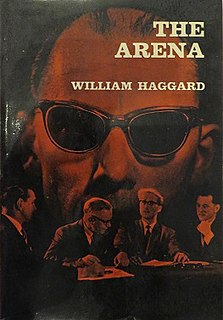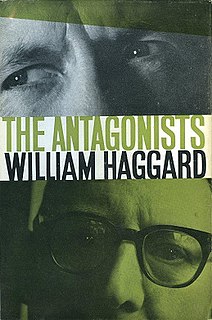
Sir Henry Rider Haggard was an English writer of adventure fiction romances set in exotic locations, predominantly Africa, and a pioneer of the lost world literary genre. He was also involved in land reform throughout the British Empire. His stories, situated at the lighter end of Victorian literature, continue to be popular and influential.

Methaqualone is a sedative and hypnotic medication. It was sold under the brand names Quaalude and Sopor among others, which contained 300 mg of methaqualone, and sold as a combination drug under the brand name Mandrax, which contained 250 mg methaqualone and 25 mg diphenhydramine within the same tablet, mostly in Europe. Commercial production of methaqualone was halted in the mid-1980s due to widespread abuse and addictiveness. It is a member of the quinazolinone class.

A romance novel or romantic novel generally refers to a type of genre fiction novel which places its primary focus on the relationship and romantic love between two people, and usually has an "emotionally satisfying and optimistic ending." However, precursors include authors of literary fiction, such as Samuel Richardson, Jane Austen, and Charlotte Brontë.

Allan Quatermain is the protagonist of H. Rider Haggard's 1885 novel King Solomon's Mines, its one sequel Allan Quatermain (1887), twelve prequel novels and four prequel short stories, totalling eighteen works. An English professional big game hunter and adventurer, in film and television he has been portrayed by Richard Chamberlain, Sean Connery, Cedric Hardwicke, Patrick Swayze and Stewart Granger among others.
William Haggard was the pseudonym of Richard Henry Michael Clayton, the son of the Rev. Henry James Clayton and Mabel Sarah Clayton. He was an English writer of fictional spy thrillers set in the 1960s through the 1980s, or, as the writer H. R. F. Keating called them, "action novels of international power." Like C. P. Snow, he was a quintessentially British Establishment figure who had been a civil servant in India, and his books vigorously put forth his perhaps idiosyncratic points of view. The principle character in most of his novels is the urbane Colonel Charles Russell of the fictional Security Executive,, who moves easily and gracefully along Snow's Corridors of Power in Whitehall. During the years of the fictional spy mania initially begun by the James Bond stories, Haggard was considered by most critics to be at the very top of the field.

Meprobamate—marketed as Miltown by Wallace Laboratories and Equanil by Wyeth, among others—is a carbamate derivative used as an anxiolytic drug. It was the best-selling minor tranquilizer for a time, but has largely been replaced by the benzodiazepines due to their wider therapeutic index and lower incidence of serious side effects.

The Stuff is a 1985 American satirical science fiction horror film written and directed by Larry Cohen and starring Michael Moriarty, Garrett Morris, Andrea Marcovicci, and Paul Sorvino. It was also the last film of noted actor Alexander Scourby. In the film, a sweet and addictive alien substance becomes a popular dessert in the United States, but soon begins attacking people and turning them into zombies. This film is a satire on the American lifestyle and consumer society.
The Palliser novels are novels written in series by Anthony Trollope. They were more commonly known as the Parliamentary novels prior to their 1974 television dramatisation by the BBC broadcast as The Pallisers. Marketed as "polite literature" during their initial publication, the novels encompass several literary genres including: family saga, bildungsroman, picaresque, as well as satire and parody of Victorian life, and criticism of the English government's predilection for attracting corrupt and corruptible people to power.
Denise Giardina is an American novelist. Her book Storming Heaven was a Discovery Selection of the Book-of-the-Month Club and received the 1987 W. D. Weatherford Award for the best published work about the Appalachian South. The Unquiet Earth received an American Book Award and the Lillian Smith Book Award for fiction. Her 1998 novel Saints and Villains was awarded the Boston Book Review fiction prize and was semifinalist for the International Dublin Literary Award. Giardina is an ordained Episcopal Church deacon, a community activist, and a former candidate for governor of West Virginia.
Patrick Cave is a British novelist.
Play Dirty is a thriller novel written by Sandra Brown in 2007. According to WorldCat, the book was held in more than 2500 libraries as of February, 2014.

Reservoir Pups is the first novel of the Eddie & the Gang with No Name trilogy by Northern Irish author, Colin Bateman, published on 13 November 2003 through Hodder Children's Books. It is Bateman's first young adult novel.

Shelter is the first novel of the "Mickey Bolitar" young adult series by American crime writer Harlan Coben. It features the teenage nephew of Coben's popular protagonist Myron Bolitar. The novel was first published on September 15, 2011, by Orion Books in the UK and Puffin Books in the US.

The Cygnet and the Firebird is a fantasy novel by Patricia A. McKillip, a sequel to her earlier novel The Sorceress and the Cygnet. Despite a mixed reception, it was nominated for the 1994 Mythopoeic Fantasy Award for Adult Literature. It was first published in hardcover by Ace Books in September 1993, with a paperback following from the same publisher in September 1995. The first British edition was published in paperback by Pan Books in July 1994. It was subsequently combined with The Sorceress and the Cygnet into the omnibus collection Cygnet, issued in trade paperback by Ace Books in March 2007. It has also been translated into French.
Slow Burner is a 1958 suspense novel by the British author William Haggard published in England by Cassell and in the United States by Little Brown. It was Haggard's first novel and the first of many involving his protagonist Colonel Charles Russell, the head of the urbane unobtrusive but lethal Security Executive, a government counter-intelligence agency clearly based on the actual MI5 or Security Service, who moves easily and gracefully along C.P. Snow's Corridors of Power in Whitehall. Like most of the other works by Haggard and some by his near contemporaries Victor Canning and Michael Gilbert, it is both a standard novel of suspense and a semi-political thriller about the reactions of those in high government positions who scent potential danger to their own political standing from the on-going events of the novel.
Venetian Blind is a 1959 suspense novel by the British author William Haggard published in England by Cassell and in the United States by Ives Washburn. It was Haggard's second of 21 books involving his urbane protagonist Colonel Charles Russell, the head of the unobtrusive but lethal Security Executive, a government counter-intelligence agency clearly based on the actual MI5 or Security Service, where he moves easily and gracefully along C.P. Snow's Corridors of Power in Whitehall. Like all of Haggard's books it has standard elements of suspense thrillers but in addition there is an almost Henry Jamiesian exposition of British establishment mores and character, in both the government and in the world of upper-class financiers, scientists, industrialists, their families, and hangers-on, making it very much a novel of character.

The Arena is a 1961 suspense novel by the British author William Haggard published in England by Cassell and in the United States by Washburn. It was Haggard's third of 21 books involving his urbane protagonist Colonel Charles Russell, the head of the unobtrusive but lethal Security Executive, a government counter-intelligence agency clearly based on the actual MI5 or Security Service, where he moves easily and gracefully along C.P. Snow's Corridors of Power in Whitehall. Like all of the other works by Haggard it is a standard novel of suspense, but combined, as usual with Haggard, with other elements: the reactions of those in high government positions who fear non-political events that could endanger Britain's place in the world, along with a tough-minded, even cynical depiction of financial shenanigans in the City of London. And like Venetian Blind, Haggard's previous book, it is very much a novel of character, albeit a bleak one.

The Antagonists is a 1964 suspense novel by the British author William Haggard published in England by Cassell and in the United States by Ives Washburn. It was Haggard's sixth of 21 books involving his protagonist Colonel Charles Russell, the urbane head of the unobtrusive but lethal Security Executive, a government counter-intelligence agency clearly based on the actual MI5 or Security Service, where he moves easily and gracefully along C.P. Snow's Corridors of Power in Whitehall. Like Haggard's earlier books it has standard elements of suspense thrillers along with detailed examinations of character, but in this case with more scenes of direct action and somewhat less dissection of character and motivation than in the first three books.











